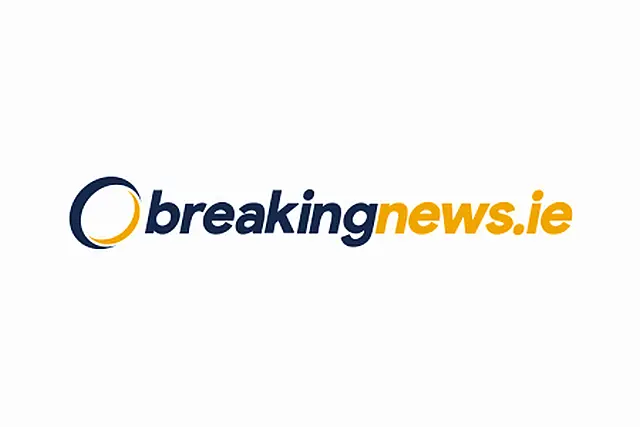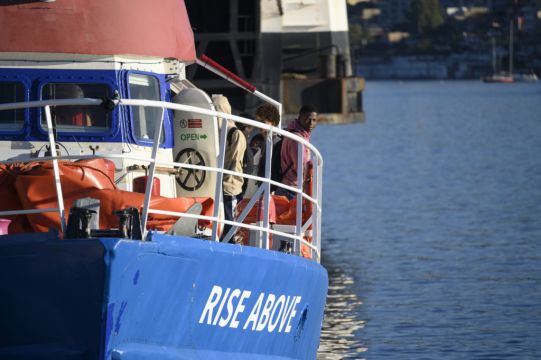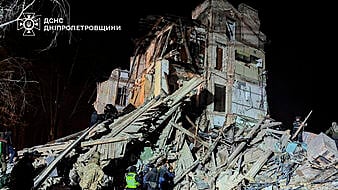A humanitarian group has appealed to France for a port where it can take 234 rescued migrants after over two weeks of silence from Italy’s new hard-right government, which refused to offer multiple private rescue boats a safe harbour.
European aid group SOS Mediteranee said the situation on the ship it operates has reached “a critical limit”.
The Ocean Viking made the first rescue of its current mission 18 days ago; Italian authorities have ignored repeated requests for a port assignment.
“We are facing very severe consequences, including risks of loss of lives,” said Xavier Lauth, the group’s director of operations.

“Physical and psychological well-being of survivors and crew have been exhausted by over two weeks of blockage at sea. It is now a humanitarian emergency needing an immediate response.”
Italy is in a standoff with some of the charities operating rescue boats in the central Mediterranean Sea.
Authorities directed two ships – the Geo Barents and the SOS Humanity – to a port in Sicily over the weekend for the purpose of identifying migrants they deemed “vulnerable”.
Passengers not considered vulnerable were not allowed to get off.
The captains of both ships have since refused orders to return to international waters with nearly 250 migrants between them. The humanitarian groups, legal experts and human rights activists said the selection procedure was illegal.
The head of the Geo Barents mission, Juan Matias Gil, said Italian authorities started another such sorting process on Tuesday but the crew was insisting all 213 passengers were vulnerable and entitled to protection as people rescued at sea.

“We continue to push to have everyone get off,” Mr Gil told reporters in Catania, Sicily.
“We know well all of the violence that they suffered in Libya and a week on board. They need psychological service.”
A German humanitarian group said its ship docked in southern Italy early on Tuesday and disembarked all 89 rescued people on board, ending one of the migrant rescue sagas.
Germany-based Mission Lifeline posted videos on social media of the Rise Above docking in Reggio Calabria and said the “odyssey of 89 passengers and nine crew members on board seems to be over”.
The group had made repeated requests to Italy to assign a safe port for the 80-foot freighter after conducting three rescues on November 3 and said it entered Italian waters over the weekend without consent because of rough seas. Six of the original 95 rescued people on board were evacuated at sea for medical reasons.
Mission Lifeline spokeswoman Hermine Poschmann said she did not know why the Rise Above was allowed to disembark all its remaining passengers.

The group quoted Italian news reports as saying the Italian government had determined the Rise Above was a “distress case at sea”.
But Ms Poschmann said at no time did the group ever declare an emergency or mayday.
Italy’s interior minister, Matteo Piantedosi, laid the groundwork to close Italian ports to humanitarian rescue ships by drafting measures contending that two aid groups — SOS Humanity and SOS Mediteranee — were violating procedures by not properly co-ordinating their rescues.
The directive did not include Mission Lifeline, although Ms Poschmann said the Rise Above followed the same search and rescue procedures as the other ships.
SOS Humanity, which is also based in Germany, confirmed on Tuesday that the 35 people remaining on board its ship following the vetting process submitted requests for fast-tracked political asylum through a court in Catania. It said the condition of the people on the Humanity 1 was deteriorating daily, with some refusing proper meals and growing more distressed.
In desperation, two Syrian men jumped into the sea from one of the ships, the Geo Berents, on Monday, and a third went in after to try to save them, said Doctors Without Borders, which operates the ship. One of the men was taken from the ship by ambulance on Tuesday after getting a fever.
The charity said the man, identified only as Ahmed, fled Syria a year ago for Libya, and that he had been subject to abuse and violence in a Libyan prison, where he landed after his first attempt at a crossing was intercepted by the Libyan coastguard.
“He told us that since then he has suffered strong pains in his back due to the violence he suffered,” said Maurizio Debanne, a spokesman for the aid group.







